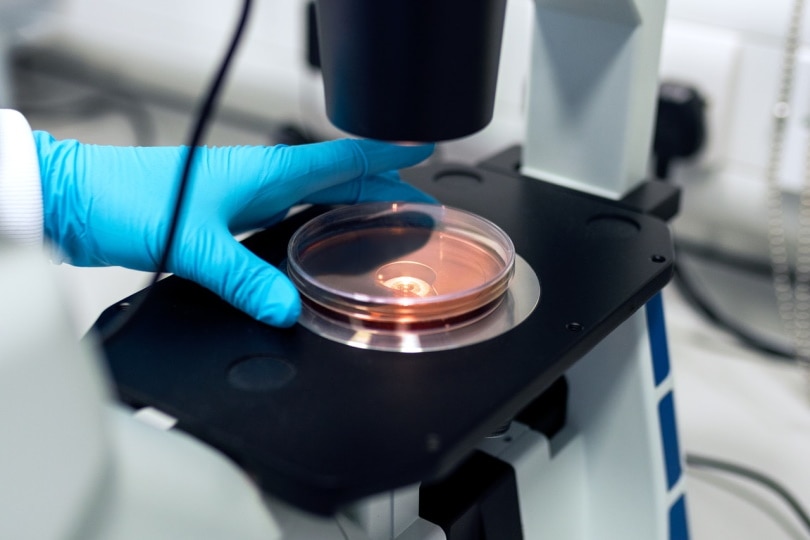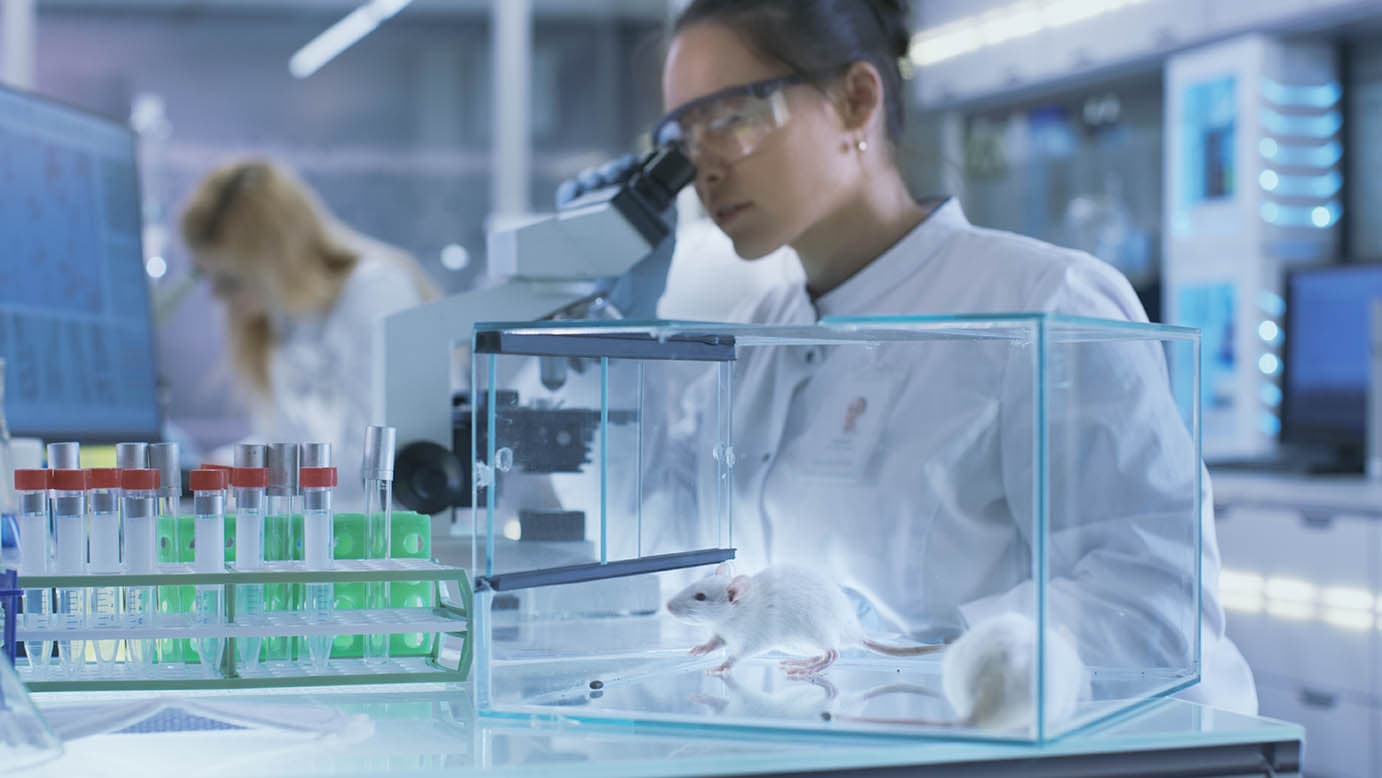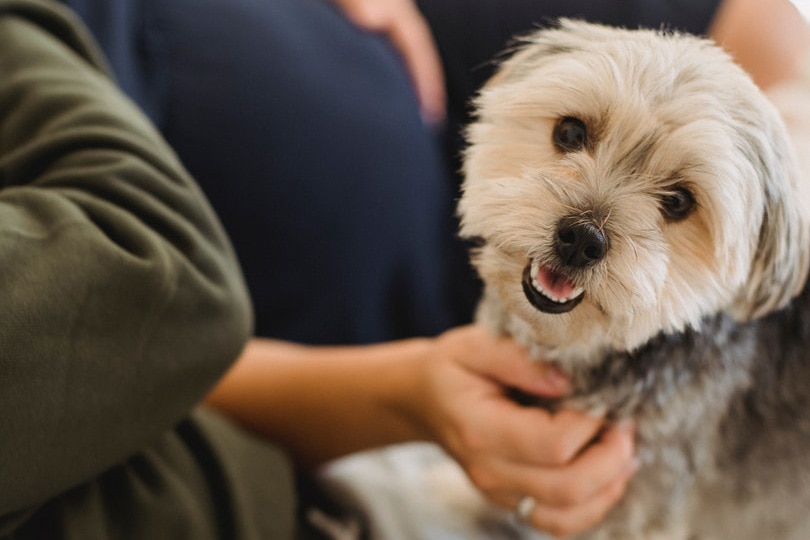We all know that we will have to say goodbye to our pets one day, and it never feels like our time together is long enough. It’s the dreaded thought at the back of every dog owner’s mind: the limited amount of time that we get with our pets. But what if there was a way to make your dog’s memory live on forever—quite literally?
If you have considered cloning your beloved pup after they pass, you’ll need to know all the factors that influence the cost. The cost to clone a dog is $50,000. Here, we explain precisely what cloning is, where you can get it done, and whether it’s in your budget.
What Is Cloning?
Cloning is the scientific process of collecting a somatic cell from the specimen and placing it into an empty egg.1 It’s a pervasive scientific process that involves very carefully performed tasks.
In layman’s terms, what happens is the DNA sample is extracted from the dog’s somatic cell that was given to the lab. Another dog’s egg has its nucleus removed and loses the genetic information of the egg donor, and then the somatic cell from the dog to be cloned is inserted into the egg. Using an electrical current, the two cells are fused to form an embryo.
At that point, it is a waiting game to see if the embryo takes hold. If it does, it is then placed into the womb of a healthy surrogate female. That surrogate carries the pup to completion, giving birth naturally. So, it’s partially organic, as we can’t yet grow full bodies in a lab without a mother.
It can take quite a few tries for an embryo to take hold. The likelihood of a surviving clone is roughly 2% to 3%, which is why it usually requires creating so many fertilized eggs initially. Only a few of them will make it to the embryo stage and even fewer to the womb.
ViaGen Pets: The American Cloning Company

A company called ViaGen Pets in Texas is currently tackling the challenge of cloning people’s pets. This company reunites owners with an exact replica of their pets. They also take the lead in cloning animals other than dogs and cats.
Dogs cost $50,000 to clone. Cats are significantly less expensive to clone than dogs, costing a total of $35,000, which is a big difference.
ViaGen’s first successful cloning was of a Jack Russell Terrier named Nubia. She was born in 2012. There’s no evidence to be found of her passing, which means that she would be over 10 years old today.
Initial Deposit
Before the cloning process takes place, this company requires a $25,000 deposit in advance. That is a lump sum all at once, and it doesn’t look like there’s any financing available. The website requests that you reach out to one of its associates for further guidance. During one of these conversations, payment options might be available depending on the circumstances. However, there could be certain stipulations that the company has in place.
Final Deposit
The second installment of $25,000 is due once the cloning process is complete.
The problem with cloning is that you never quite know when or if it’s going to be successful. If you’re not a person who has $25,000 readily available at all times, it can pose a bit of a challenge.
These are all considerations and definitely things to bring up with an associate if you decide to progress with the cloning process.

Refunds/Discounts
ViaGen says that it will refund if a clone is unsuccessful. It also offers other options, such as storing the DNA. If the service you’re paying for doesn’t produce fruitful results, it will take responsibility and ownership of these issues as they arise.
At this time, there does not appear to be any available discount when it comes to pet cloning.
Additional Factors to Consider
Since cloning is such a heavy expense with no financial assistance, it can be a bit challenging to pay for. But besides being able to afford to clone, there are other things to consider.
There is always a chance that the cloning process will not be successful. For instance, reproduction through cloning is never 100%. If you have a failed cloning or the sample is no good, that can put a major damper on your hopes with the process.
There are also ethical and moral implications about cloning that you might not have considered. Perhaps you’re the kind of person who doesn’t fully understand cloning, in which case, your expectations might be off or misconstrued.

Personality Differences
Your clone pet will not have the same personality as your previous pet. This is a common misconception. The dog that you get will indeed be the exact carbon copy of your previous dog. However, their personality could be like night and day.
For instance, your dog might have been hyper, active, or protective, but this new dog could be extremely soft, docile, and timid. There’s no sure-fire way to know exactly what you’re going to get. Think of it as having an identical twin rather than a total mind transfer.
If you get a dog under the pretense that they will be exactly like their old self or have any of the same memories, you will be sadly mistaken or let down. Make sure to ask any questions you have about personality or characteristics before opting for the service.
Ethical Concerns
Some would argue that you’re playing with nature when it comes to cloning. You are taking an organic process and making it lab-created, essentially changing the life form entirely. So, there are certain questions as to the ethics involved in cloning.
Successful Embryo
It is infrequent to get a clone birth. It takes so many different attempts most of the time to get a successful embryo. Even after the successful embryos are implanted, the pregnancies don’t always make it to full term.
There is a chance that the DNA sample that you give to the lab won’t take. They might not get any good somatic cells out of the sample, creating the dilemma of not replicating the genetic structure. If that happens, it’s going to be a huge letdown for you.
You have to consider if you really want to go through the financial and emotional impact if things don’t work out. These are things that you have to be prepared for when you opt for cloning services. It doesn’t always work out as planned, and it’s still a relatively new science.

Financial Burden
Since this is such a huge financial burden, is the reality of having a look-alike around your household really going to soothe your grieving when it comes to your original pet? If not, you could pay all the money in the world and still never be satisfied with the result.
This is an emotional choice. We love our pets more than anything in the world, and we can never copy them, no matter how identical the DNA structure is. You have to think about whether it would be worth it to you in the long run.
Everyone is different, and everyone responds to grief and connection in various ways. So ultimately, the decision is yours.
Timeline of DNA Transfer

Since DNA starts to deteriorate so quickly upon death, it is crucial to get a DNA sample as quickly as possible. The Texan company does have services to preserve your pet’s DNA long before they ever pass. This way, if you find yourself without your beloved dog, you can start the process of cloning at a time of your choice. There is a fee for the service, though. You can find out more information about DNA storage here.
Otherwise, it is a gamble on whether you will be able to get the DNA sample in time. It won’t be until the laboratory specialist starts to break down the DNA that they will see if it is viable and able to work in cloning. This can be an incredibly lengthy process.
If you are genuinely interested in cloning services, we recommend asking a professional at the facility.
Final Thoughts
The likelihood of the average Joe being able to clone their pet is incredibly low. But with science increasing all the time, it might become a commonplace practice in the future. However, there are arguments against the effectiveness of cloning.
In any case, now you know that the only active cloning company in the United States, ViaGen Pets, will clone your dog for $50,000 and even preserve your dog’s DNA before they pass. Does cloning seem like the right fit for you?
Related Reads:
Featured Image Credit: ElfinFox, Pixabay













